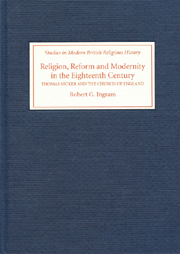Book contents
- Frontmatter
- Contents
- Dedication
- Preface
- Abbreviations
- 1 ‘Efforts at Amendment’
- 2 Becoming an Anglican
- 3 Becoming an Insider
- 4 The Church and the Enlightenment
- 5 The Church and the Parishioners
- 6 The Church and the State
- 7 The Church and America
- 8 The Church and Churches Abroad
- Epilogue
- Bibliography
- Index
- Previously published volumes in this series
3 - Becoming an Insider
Published online by Cambridge University Press: 12 September 2012
- Frontmatter
- Contents
- Dedication
- Preface
- Abbreviations
- 1 ‘Efforts at Amendment’
- 2 Becoming an Anglican
- 3 Becoming an Insider
- 4 The Church and the Enlightenment
- 5 The Church and the Parishioners
- 6 The Church and the State
- 7 The Church and America
- 8 The Church and Churches Abroad
- Epilogue
- Bibliography
- Index
- Previously published volumes in this series
Summary
Many had ideas about how to reform the eighteenth-century Church of England, but few were in a position to do so. In 1720, not many would have thought it likely that a defector from Dissent would one day become archbishop of Canterbury; only a convert from Catholicism would have seemed a more unlikely candidate. Yet within a decade and a half of his ordination, Thomas Secker was on the episcopal bench and in a position to formulate and implement policy within his dioceses. How did this convert Dissenter become an Anglican insider? It is a necessary question to address because only when Secker wielded considerable power and influence within the established Church could he hope effectively to reform it.
Secker's ascent of the ladder of ecclesiastical preferment also illuminates clearly the organic relationship of church and state in England during the first two-thirds of the eighteenth century. Neither ability, nor connections, nor political influence alone were sufficient guarantees for clerical advancement: it took a mixture of all three. And while Secker was certainly able and hard-working, he needed influential patrons and politically-connected friends to help him weather ‘the varying political tempests’ in church and state. One of modernity's hallmarks is he secularization of politics which attends legalized religious pluralism and the privatization of religion – the seemingly inevitable result of this secularizing process is the separation of church and state. That separation would have been a concept utterly foreign to Secker and his contemporaries, during whose lives ‘[r]eligion and politics were not regarded as discrete spheres of activity. The two were inextricably linked in both the theory and practice of government.’
- Type
- Chapter
- Information
- Religion, Reform and Modernity in the Eighteenth CenturyThomas Secker and the Church of England, pp. 45 - 70Publisher: Boydell & BrewerPrint publication year: 2007



